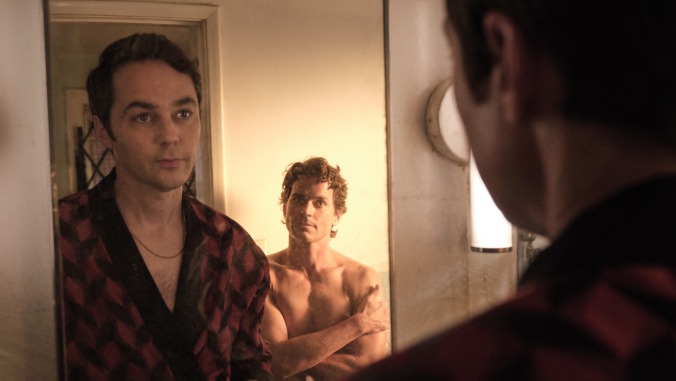Netflix’s Boys In The Band isn’t as claustrophobic as the original, but still packs a punch


Zachary Quinto still hasn’t seen the original Boys In The Band. “I hadn’t seen it when I got invited to do the play, so I didn’t think that was very good time to watch it,” Quinto said on Keep It this week of avoiding the 1970 film after being cast in the 2018 Broadway revival of the play on which it was based. “And then, shortly after the play, they talked about our movie… But now I’m safe to watch the original.”
Not wanting to be influenced by a previous iteration of a project is an easy call for an actor, but as a critic it’s a more complicated dilemma. How fair is it to compare two versions of the same story? In the case of Boys In The Band, it’s impossible to separate the art from its historical influence. Mart Crowley’s 1968 off-Broadway hit—and 1970 film—were groundbreaking moments for gay representation. For the first time, gay men were presented in a slice-of-life piece that treated them as fully formed individuals rather than tokens meant to represent an entire culture. Crowley’s script benefits from being written more than a decade before the HIV/AIDS pandemic would steal an entire generation of the community (including much of the original Boys cast) and color gay stories for 20 years. At the start of both versions of the film, a character explains that his psychiatrist had to cancel their appointment because of “a virus or something. He said he was just too sick.” Fifteen years later, that line would have foreshadowed the tragedy ahead for the doctor, but here it’s a throwaway line used to explain a party guest’s early arrival. That perhaps encapsulates the importance of Boys In The Band: It’s about gay men just being.
More specifically, Boys centers on Michael (Jim Parsons) and the gaggle of gays gathering at his New York City apartment on a Saturday evening to celebrate the birthday of their friend Harold (Quinto). The aforementioned early arriver is Donald (Matt Bomer), and most of the film’s opening act operates as a two-hander between Michael and Donald until the ensemble slowly grows to include shameless flirt Larry (Andrew Rannells) and his recently out boyfriend Hank (Tuc Watkins), unabashedly flamboyant Emory (Robin de Jesús), and bookish Bernard (Michael Benjamin Washington). As in real life, the dynamic of the group changes with each new arrival—though never as much as when Michael’s college roommate, to whom he’s still closeted, shows up unexpectedly. The addition of Alan (Brian Hutchison) sets in motion a series of conversations and confrontations that lead to a traumatic “game” that has each member of the party revisiting the story of their first love.
As with the 1970 version of the film, the new movie’s cast is identical to that of its preceding stage production. The benefits of months of rehearsal and a Broadway run are evident in the easy and familial nature with which the men effortlessly transition from trading acerbic insults to warmly embracing time and time again. (Rannells and Watkins even developed into a real-life couple while working together, despite their characters’ tumultuous existence on-screen.) But where the original film traded out stage director Robert Moore for William Friedkin (The French Connection, The Exorcist), Tony-winner Joe Mantello remained at the helm as the Ryan Murphy production transitioned to the screen. Mantello is the first to tell people he hasn’t had a lot of experience directing movies (his last feature was the 1997 adaptation of his Broadway hit Love! Valour! Compassion!), yet his version of Boys fights its stage roots far more than Friedkin’s film.
There’s no denying the Boys film script—practically unchanged over 50 years, aside from one line aging up the characters by a decade to more accurately reflect the age of the cast—was originally envisioned for the theater; its frequent emotional monologues broken up by sections of rapid-fire banter, with up to nine characters chiming in on top of each other. Friedkin leaned into that stage origin by setting up dynamic wide shots that captured as much of the action in one frame as possible, only cutting to singles at particularly intimate moments. In contrast, the new Boys jumps from close-up to close-up, relying on quick cuts rather than allowing the cast to flow through dialogue they’d impressively volleyed at each other night after night at the Booth Theatre in 2018.
It’s a disservice to the stellar ensemble that Netflix’s Boys insists on expanding the world beyond the pressure cooker of Michael’s one-bedroom apartment. As the story transitions from a dance-filled dinner party to drunken professions of love, the new film breaks the tension by cutting to flashes of the characters’ memories instead of letting the audience sit in the discomfort. It’s a reasonable assumption that the flashbacks were added in an attempt to update the feel of the piece, but their insertion interrupts beautiful work from Washington and Watkins (though de Jesús is thankfully allowed to stew in his most haunting moment). Similarly, the final minutes of the film follow the characters home from the party, taking us outside the apartment in a way that feels counter to the intimacy of the rest of the evening.
That’s not saying all the updates are unwelcome. The close-ups highlight knowing glances and other stolen moments between characters that would have been lost in other stagings, and lines like the one referencing the sick therapist are glossed over in a way that seems intentional—an acknowledgement of how audiences may interpret certain dialogue in the light of 2020. And the casting of de Jesús, who is Puerto Rican, as Emory allowed Mantello to explore race in a way that the original stage and film productions did not. Mantello smartly tethered the effeminate Emory to Bernard (previously the piece’s only character of color), completely altering the meaning of entire sections of dialogue that went unchanged on paper. The new movie also includes a moment from the stage production that was left out of the 1970 film—a final line for “Cowboy,” a sex worker presented as a gift from Emory to Harold (and played with charming dopishness by Charlie Carver)—that brings much-appreciated humanity to a character who otherwise serves as a punching bag for the older partygoers.
Mart Crowley famously got sober for six weeks to write the original Boys. The playwright didn’t see himself in the characters on stage, and he wanted to change that. It’s a testament to his specificity that the script plays as well today as it did in 1968. (He was on set during the filming of Netflix movie but died in March at the age of 84.) Boys doesn’t tell every queer man’s story, but—for better or worse—Crowley’s story encapsulates gay life most honestly when Michael and Harold part ways with a tense exchange (Quinto relishing in chewing up the scenery with every over-articulated insult). Out of context, Harold’s goodbye would be friendship-ending, as would the punches and tears exchanged between other characters earlier the evening. But we know that by tomorrow all will be forgiven—because these men aren’t just friends, they’re an unapologetically dysfunctional family. They need each other as the world around them stares, laughs, and oppresses them. We’ve made a lot of progress in the fight for LGBTQ rights, but many young queer people are still left with only their chosen family after coming out. Hopefully in another 50 years the story of Boys In The Band will seem woefully antiquated. For now, it’s a necessary reminder of how far yet how little we’ve actually come.